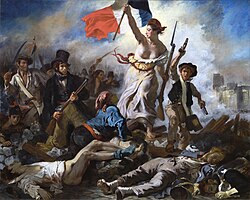
Back الثورة البوليفارية Arabic Bolivarian inqilabı Azerbaijani Bolivarska revolucija BS Revolució Bolivariana Catalan Bolivarianske revolution Danish Bolivarische Revolution German Bolivara revolucio Esperanto Revolución bolivariana Spanish Bolibartar Iraultza Basque انقلاب بولیواری Persian
| Part of the Pink tide | |
 Soldiers carrying flags featuring Chávez eyes. | |
| Date | 2 February 1999 – present (25 years, 11 months and 8 days) |
|---|---|
| Location | |
| Cause | Presidencies of Hugo Chávez and Nicolás Maduro |
| Motive | Establishment of cultural and political hegemony[1][2] |
| Outcome | Crisis in Bolivarian Venezuela |
 |
|---|
|
|
| Part of a series on |
| Political revolution |
|---|
 |
|
|
The Bolivarian Revolution is an ongoing political process in Venezuela that was started by Venezuelan President Hugo Chávez, the founder of the Fifth Republic Movement and later the United Socialist Party of Venezuela (PSUV), and his successor Nicolás Maduro. The Bolivarian Revolution is named after Simón Bolívar, an early 19th-century Venezuelan revolutionary leader, prominent in the Spanish American wars of independence in achieving the independence of most of northern South America from Spanish rule. According to Chávez and supporters, the Bolivarian Revolution seeks to build an inter-American coalition to implement Bolivarianism, nationalism and a state-led economy.
On his 57th birthday, while announcing that he was being treated for cancer, Chávez announced that he had changed the slogan of the Bolivarian Revolution from "Motherland, socialism, or death" to "Motherland and socialism. We will live, and we will come out victorious."[3]
As of 2018, the vast majority of mayoral and gubernatorial offices are held by PSUV candidates, while the opposition Democratic Unity (MUD) coalition won two thirds of parliamentary seats in 2015.[4] Political hostility between the PSUV and MUD have led to several incidents where both pro-government and opposition demonstrations have turned violent, with an estimated 150 dead as a result in 2017.[5] Several opposition figures have been subject to politically motivated detentions.[6]
Following the death of Chávez in 2013, the revolution has gone into social decline and the political and economic situation in Venezuela has rapidly deteriorated.[7]
- ^ Canelón-Silva, Agrivalca Ramsenia (2014). "Del Estado Comunicador Al Estado De Los Medios. Catorce Años De Hegemonía Comunicacional En Venezuela". Palabra Clave. 17 (4): 1243–78. doi:10.5294/pacla.2014.17.4.11.
- ^ Rory, Carroll (2014). Comandante : Hugo Chavez's Venezuela. Penguin Books: New York. pp. 182–94. ISBN 978-0143124887.
- ^ Aponte-Moreno, Marco; Lance Lattig (26 March 2012). "Chavez: Rhetoric Made in Havana". World Policy Journal. 29 (Spring 2012): 33–42. doi:10.1177/0740277512443528. Archived from the original on 19 October 2017. Retrieved 31 May 2012.
- ^ "Venezuela profile – Timeline". BBC News. 26 April 2017. Retrieved 3 May 2017.
- ^ "Venezuelan opposition activists march to Leopoldo Lopez' jail". Reuters. 28 April 2017. Retrieved 3 May 2017.
- ^ "World Report 2017: Rights Trends in Venezuela". Human Rights Watch. 12 January 2017. Retrieved 10 July 2019.
- ^ Watts, Jonathan; correspondent, Latin America; López, Virginia (2 May 2017). "Venezuela plan to rewrite constitution branded a coup by former regional allies". The Guardian. ISSN 0261-3077. Retrieved 3 May 2017.
{{cite news}}:|last2=has generic name (help)